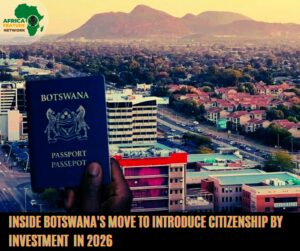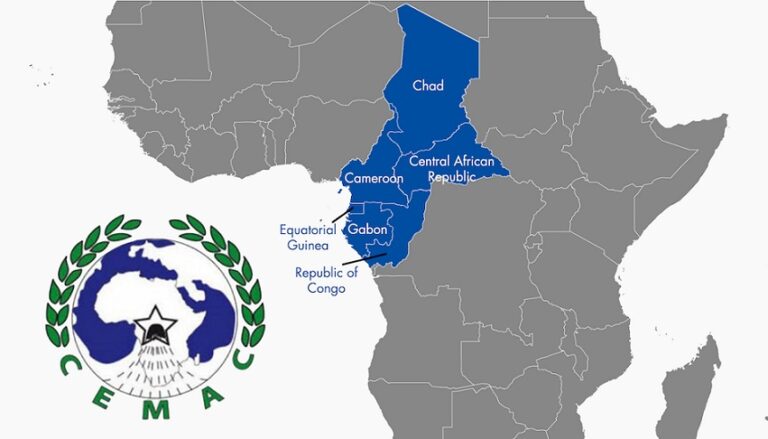Beginning in 2026, Botswana is expected to open a new chapter in its national development by launching a Citizenship by Investment Program, a groundbreaking initiative that will allow eligible foreign investors to obtain citizenship through a financial contribution estimated between US$75,000 and US$90,000. This marks a major policy shift for one of Africa’s most stable and well-governed nations, and one that could redefine how countries on the continent attract capital, talent, and innovation.
For decades, Botswana has stood as a model of democratic governance, prudent economic management, and low corruption. Its diamond-driven economy has been a success story, lifting millions out of poverty and building one of the highest per capita incomes in Africa. Yet even with this record of stability and growth, the government recognizes that reliance on diamond mining is unsustainable in the long term. Global price fluctuations, changing consumer preferences, and the transition toward synthetic diamonds have made diversification a national priority. The Citizenship by Investment program is emerging as part of a wider strategy to strengthen new sectors such as finance, tourism, agriculture, renewable energy, and digital innovation.
According to the Government of Botswana, the upcoming program is designed not only to attract foreign investors but to align with a new vision of inclusive economic transformation. It will invite individuals who can contribute meaningfully to the economy through investment, job creation, and knowledge exchange. The model being developed in partnership with Arton Capital, a global advisory firm specializing in citizenship and residency programs, signals the government’s commitment to managing the initiative within international standards of transparency and integrity.
This program is also historic in another way. Botswana, which has traditionally maintained one of the most conservative citizenship frameworks in Africa, is set to permit dual citizenship under this initiative. That change alone is a powerful statement of openness, suggesting a new willingness to integrate Botswana into global economic networks while maintaining its sovereignty and institutional discipline.
Early reports indicate that citizenship will not be granted automatically upon payment, but through a rigorous process involving background checks, financial due diligence, and clear evidence of legitimate income. The investment threshold, expected to range between US$75,000 and US$90,000, is intended to keep the program accessible yet credible, ensuring that applicants are serious investors with the capacity to make long-term contributions. The government is expected to finalize legal frameworks and operational guidelines in 2025, with full implementation beginning in early 2026.
While the idea of citizenship through investment has sparked debate globally, Botswana’s approach appears to be more strategic than opportunistic. Rather than simply offering passports, the government seeks to attract individuals who will invest in the country’s productive sectors and foster innovation.
In Africa, a few countries have experimented with similar programs, though with varying levels of success. Comoros, for example , introduced a citizenship-for-investment plan in 2008 but later suspended it due to governance concerns. Mauritius, Seychelles, and Cape Verde have adopted residency-by-investment frameworks that offer permanent residence and eventual naturalization after sustained economic participation. On the mainland, Egypt remains the only country currently granting citizenship directly through investment, with thresholds beginning at around US$250,000.
If implemented as planned, Botswana’s program will become the first structured and transparent Citizenship by Investment framework in sub-Saharan Africa, setting a new precedent for how countries on the continent can attract responsible investors while maintaining integrity
Several commentators, including Finance in Africa, suggest Botswana’s upcoming Citizenship-by-Investment program may mark a turning point in the country’s efforts to reposition itself as a diversified investment destination. For example, The Habari Network reports that in the first week of pre-registration the program drew 464 expressions of interest from 77 countries, reflecting strong global demand. Arton Capital’s CEO, Armand Arton, has emphasized Botswana’s stable democracy, strong rule of law, and strategic location in Southern Africa as factors that give the program competitive appeal. Meanwhile, the African Development Bank’s 2025 Country Focus Report highlights Botswana’s “strong domestic fiscal capacity” (such as a tax‐to‐GDP ratio above 20 %), substantially higher than the regional average, and calls for reforms to unlock its abundant natural, human and produced capital for diversification. Together, these sources provide evidence that Botswana is being viewed by analysts and institutions as having favorable governance, regulatory, and structural attributes that could make its CBI program a credible option for investors seeking both opportunity and stability.
However, the success of such a program will depend on the country’s ability to maintain transparency and public confidence. Many citizenship-by-investment programs elsewhere have faced criticism for lack of accountability and weak oversight. Botswana’s record of integrity offers reassurance, but it will still need to ensure that the program is closely monitored, that proceeds are used for public benefit, and that citizenship remains a symbol of genuine belonging and contribution rather than privilege.
For Botswana, this initiative could also strengthen its population growth trajectory. With a relatively small population of just over 2.6 million, the country faces demographic and labor market challenges that limit the scale of domestic consumption and production. By attracting skilled investors and entrepreneurs, the program could help balance demographic gaps, stimulate enterprise, and inject new energy into national development.
At Africa Feature Network (AFN), we view Botswana’s upcoming Citizenship by Investment Program as one of the most significant economic policy innovations emerging from Africa in recent years. It reflects a deeper continental transition where nations are reimagining citizenship not only as a matter of identity but as a framework for shared growth, responsibility, and progress.
The policy, if well implemented, could become a blueprint for inclusive prosperity across Africa: a model where capital meets purpose, and where the promise of citizenship is tied to the collective advancement of society. Botswana’s story reminds us that transformation often begins with vision — and when matched with discipline, that vision can shape the future of a nation and the continent at large.



